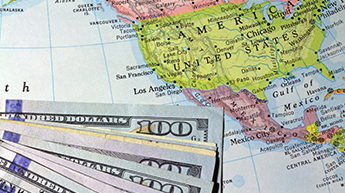Can I Get a Payday Loan in Another State?

Turning to a payday lender is often the first thing that crosses your mind if you have an unexpected expense while being out of cash. But facing a financial emergency out of state where you reside may add some stress to your everyday life. And everything gets even more difficult if payday lending is illegal in your state.
You might rightly ask, “Can I get a payday loan in another state? And what about getting it online?” Unfortunately, in most cases, you will be denied a loan in another state if you’re not a permanent resident. However, there are some exceptions, along with the alternatives to consider. Let’s take a look at ways to get a payday loan in a different state and talk about other options you can access when it comes to borrowing money.
Table of Contents
- Is It Possible to Get a Payday Loan in a Different State?
- How Do Payday Loans Differ From State to State?
- What States Prohibit Payday Loans?
- Why Do Some States Ban Payday Loans?
- Pros and Cons of Getting Payday Loans Online
- Payday Loan Alternatives
- Bottom Line
- FAQ
Is It Possible to Get a Payday Loan in a Different State?
Getting a payday loan in a different state may be possible, if you can confirm your temporary residence in the state you apply in. To do this, you will be asked to provide your current living address that is listed in the lender’s operating area. However, not all loan providers are willing to work with people who live out of their state.
This happens not because they discriminate against you. In fact, payday loan laws may vary significantly by state. Payday lenders are allowed to operate only within the state that gives them a license. Therefore, they typically reject applications from residents of other states to avoid legal issues.
Summing up, you can’t simply go to a neighboring state and get a $400 payday loan there if this type of borrowing is banned in your domicile. This is also true for situations when you find yourself in need of urgent cash while being out of your state.
How Do Payday Loans Differ From State to State?
In most cases, state law regulates the following aspects:
Interest rates, fees, and finance charges; Maximum loan amounts; Repayment terms; Rollovers; Number of loans a borrower can have at a time.
Each state may have its own rules regarding these aspects. When it comes to interest rates, they may be as high as 400% or even 600%, with some states limiting them to 36%. Maximum loan amounts can differ too. For example, Nevada caps payday loan amounts at 25% of a borrower’s gross monthly income. California allows its residents to get $255 with payday loans. At the same time, Idaho limits payday loans to $1,000.
Although most payday loans have loan terms limited to 31 days, some states set extended repayment periods. In Illinois, payday loan terms can be up to 120 days, while Florida residents can repay the amounts borrowed within up to 90 days.
When it comes to rollovers, many states prohibit them in order to protect their residents from increased loan costs. However, it’s not a common rule. For example, Texas and Idaho allow up to 3 loan renewals.
Additionally, states like Delaware and Michigan allow borrowers to have multiple payday loans at once, provided that they don’t exceed the maximum loan amount limit. However, in most states, you will be allowed to have only one payday loan at a time.
Thus, you should review your state law regulation before applying for a payday loan. This will help you better understand whether a lender’s offer corresponds to your state legislation. This way, you will be able to protect your rights as a borrower.
What States Prohibit Payday Loans?
Payday loans are illegal in 13 states and the District of Columbia. Here’s the full list:
Arizona Arkansas Connecticut Georgia Maryland Massachusetts New Jersey New Mexico New York North Carolina Pennsylvania Vermont West Virginia District of Columbia
Why Do Some States Ban Payday Loans?
By doing this, state legislation wants to protect residents from predatory lending practices. As payday loan interest rates are usually pretty high, it may be difficult to handle them. Plus, they have short repayment terms, so one in five borrowers default on them. This way, people who obtain payday loans often end up paying more in interest than their initial loan amounts.
Pros and Cons of Getting Payday Loans Online
First of all, you need to keep in mind that applying for a same day payday loan online won’t help you bypass a legal payday loan ban in your state. However, borrowing money online has several benefits. Here are some of them:
No need to visit a storefront lender. The whole process can be completed from your couch; No paperwork. All the documents can be provided remotely and electronically; Simple application process. It usually takes you about 5 minutes to fill out an online form; Fast money funding. If approved, you will get the funds in your bank account within one business day after signing a loan agreement; Bad credit is accepted. Payday lenders usually don’t make hard screening through major credit bureaus. Any credit score can pass as long as a borrower is solvent.
However, online payday loans also come with several disadvantages:
Limited loan amounts and repayment terms; High interest rates; Payday loans can’t help you build credit; Potential risk of being stuck in debt.

Payday Loan Alternatives
If you’re a resident of a state that has banned payday loans but needs to borrow money fast, don’t worry. You can still access several alternatives at more favorable terms.
Payday Alternative Loans
Payday alternative loans (PADs) are credit union loans with longer repayment terms and higher loan amounts available. They are designed in order to protect members from high-cost, short-term loans with exorbitant rates.
Tribal Loans
Tribal loans are cash advance loans that are pretty similar to regular loans till payday. However, there’s one significant difference. Unlike a payday loan company, a tribal lender is not subject to state lending law due to their special legal privileges, also known as sovereign immunity. Therefore, you can turn to tribal loans even in the states where regular payday loans are banned. However, keep in mind that interest rates can still be very high.
Credit Card Cash Advances
To obtain a credit card cash advance, you don’t even need to go through an application or verification process. All you need is to have an active credit card that allows withdrawals and visit an issuer’s store or ATM with it. This is probably the fastest way to get emergency cash on hand. However, cash advances differ from credit card debts for regular purchases. Interest on the amount you withdraw accrued from the moment you receive the money, with no 0% APR draw period.
Personal Installment Loans for Bad Credit
Personal loans for bad credit allow you to get the amount of up to $5,000 (or sometimes $15,000) in full and repay the money in equal monthly payments. Installment loans usually have lower interest rates than payday ones. However, their repayment terms are longer and can be up to 24 or 60 months. Thus, they often turn out to be more costly in the long run.
Secured Loans
If you’re looking for a bad credit loan with almost guaranteed approval at reasonable rates, consider getting a secured loan. To get one, you need to secure your debt with a valuable property you own. In exchange, you will get a portion of your asset’s evaluated cost. Car title loans, share savings loans, pawn shop loans, and home equity loans are the most popular pledged loan options.
Traditional Personal Loans
A traditional personal loan is a loan offered by conventional lenders. Such loans have flexible repayment terms and provide borrowers with access to higher loan amounts of up to $100,000. However, bank loans come with strict minimum credit score requirements, so it may not be an option for borrowers with bad credit.
Bottom Line
Getting a payday loan from another state is usually not possible. You can only get approved if you’re a temporary resident of this state. This is true for both online and storefront payday loan services. However, there are multiple alternatives available, so you can access emergency financial assistance even in states that ban payday lending.
FAQ
Are Payday Loans Legal in My State?
Payday loans are legal in 37 states. However, some of them have strict regulations regarding payday lending. Residents of the following states are not allowed to get a payday loan: Arizona, Arkansas, Connecticut, Georgia, Maryland, Massachusetts, New Jersey, New Mexico, New York, North Carolina, Pennsylvania, Vermont, West Virginia, and the District of Columbia.
Can I Get a Payday Loan in Another State Online?
Loans offered by online payday lenders can’t be obtained in states that ban payday lending. Even if a lender operates online, it must have a valid license to offer payday loans in a certain state. In most cases, the state law that prohibits payday loans bans both online and storefront services.
How Much Do Payday Loans Cost?
Among the factors that can affect your payday loan cost are your state regulation rules, credit score, loan amount, and the particular lender’s conditions. In most states, a payday loan APR is about 400%. However, short-term loan costs are usually expressed in flat fees. They can be between $10 and $30 for each $100 you get.
What Are the Risks of Payday Loans?
Short-term lending often involves the risk of getting into a debt trap. As the funds must be repaid by your next payday, and the interest rate is quite high, it may be difficult to repay the loan when due.
